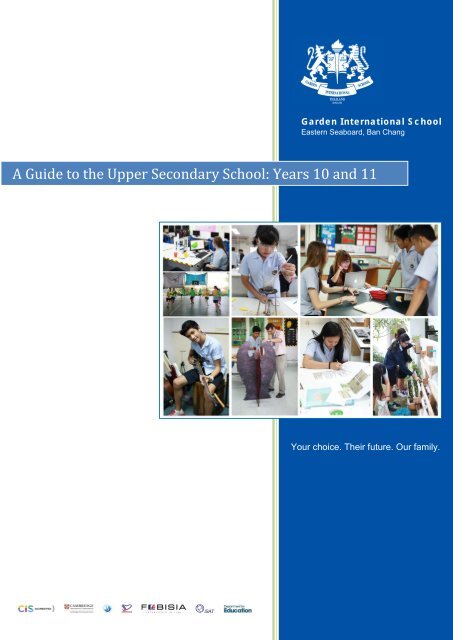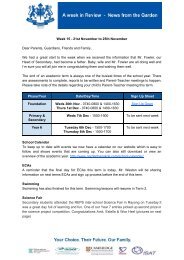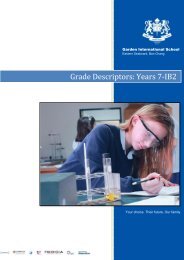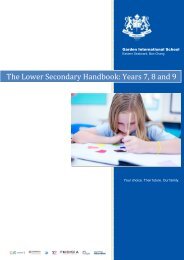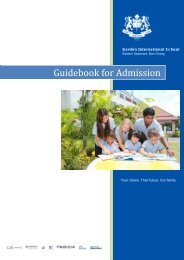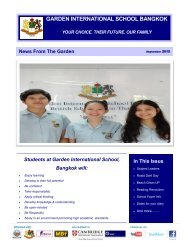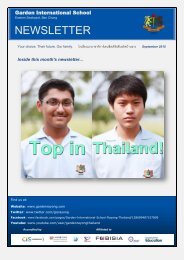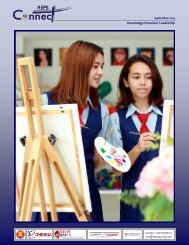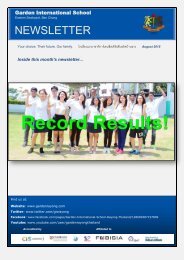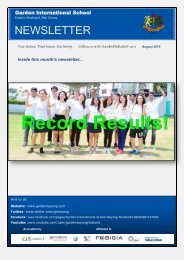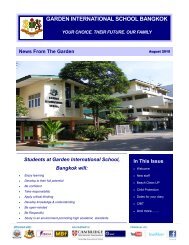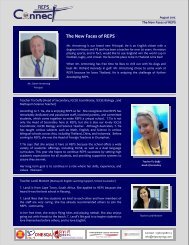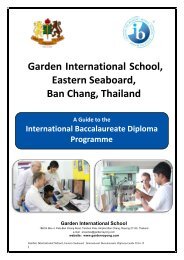Guide to IGCSE.pdf
- No tags were found...
You also want an ePaper? Increase the reach of your titles
YUMPU automatically turns print PDFs into web optimized ePapers that Google loves.
Garden International School<br />
Eastern Seaboard, Ban Chang<br />
A <strong>Guide</strong> <strong>to</strong> the Upper Secondary School: Years 10 and 11<br />
Your choice. Their future. Our family.
A <strong>Guide</strong> <strong>to</strong> the Upper Secondary School: Years 10 and 11<br />
The <strong>IGCSE</strong><br />
During Years 10 and 11 students at Garden International School (GIS) study a range of<br />
courses, some compulsory and some optional, which lead <strong>to</strong> examinations and<br />
internationally-recognised qualifications called the International General Certificates of<br />
Secondary Education (<strong>IGCSE</strong>s).<br />
Deciding which courses <strong>to</strong> study in Years 10 and 11 is important because the qualifications<br />
gained at the end of the two years may affect your child's individual career path. It is<br />
therefore crucial that the decision about what will be studied involves students, parents and<br />
teachers and is made after very careful consideration. Our Careers Advisors can also assist<br />
in making choices.<br />
What is the <strong>IGCSE</strong>?<br />
• The International General Certificate of Secondary Education (<strong>IGCSE</strong>) is a<br />
qualification awarded by Cambridge International Examinations (CIE).<br />
• It is usual for students <strong>to</strong> study from six <strong>to</strong> eight subjects.<br />
• These courses have been specifically designed <strong>to</strong> meet the needs of students of<br />
International Schools such as those at GIS.<br />
• They result in the award of internationally-recognised and respected qualifications<br />
equal <strong>to</strong> the GCSE exams that children in England and Wales take at this same<br />
stage of their education.<br />
• Cambridge <strong>IGCSE</strong> is the world’s most popular international qualification for 14 <strong>to</strong> 16<br />
year olds and is taught in over 10,000 schools in over 160 countries.<br />
• For more information about Cambridge International Examinations please go <strong>to</strong>:<br />
http://www.cie.org.uk/cambridge-for/learners-and-parents/<br />
<strong>IGCSE</strong> Assessment<br />
The <strong>IGCSE</strong> courses take two years of study and are assessed through final examinations,<br />
taken at the end of the course in May / June of the second year. Assessment methods vary<br />
from subject <strong>to</strong> subject and, as well as the final written examinations, may include oral/ aural,<br />
practical examinations, or coursework. All exam scripts are sent <strong>to</strong> CIE <strong>to</strong> be externally<br />
marked.<br />
<strong>IGCSE</strong> grades range from A* at the <strong>to</strong>p <strong>to</strong> G at the bot<strong>to</strong>m, with grades A* <strong>to</strong> C being<br />
recognised as passing grades in regards <strong>to</strong> entrance <strong>to</strong> the IB Diploma. The final<br />
percentages and grades are awarded in England, by CIE, and are then communicated back<br />
<strong>to</strong> the school.
Frequently Asked Questions<br />
1 Do all students take the same number of subjects?<br />
Students usually take between 6 and 9 <strong>IGCSE</strong> subjects.<br />
All students are expected <strong>to</strong> study the core curriculum which consists of English,<br />
Mathematics and Science. In addition they can choose from a range of further options<br />
currently available.<br />
2 Do all students study the same subject at the same level?<br />
Many subjects can be studied at different levels, often referred <strong>to</strong> as Core and Extended.<br />
3 How do the <strong>IGCSE</strong>s relate <strong>to</strong> IB?<br />
The International Baccalaureate (IB) is a two year programme of study which follows on<br />
directly from <strong>IGCSE</strong> courses. The IB Diploma provides greater breadth and depth of study<br />
than national systems allow and is an internationally recognised qualification for university<br />
entrance. The IB is highly regarded throughout the world and facilitates entrance in<strong>to</strong> <strong>to</strong>p<br />
universities world-wide.<br />
A minimum of 5 A* <strong>to</strong> C passes is required <strong>to</strong> gain entrance on<strong>to</strong> the full IB Diploma<br />
programme. A grade ‘C’ or better is required in either English First Language or English as a<br />
Second Language in order <strong>to</strong> start the IB Diploma course.<br />
Should a student not achieve 5 A* <strong>to</strong> C passes in the June examinations it is possible <strong>to</strong><br />
enrol on our IB Foundation Course which involves taking re-sits in November of the same<br />
year with the aim of achieving the minimum 5 grade ‘C’s. The results of November re-sits are<br />
published in January and depending on the results either the student can re-sit again in May<br />
or they can start studies in a personally tailored range of IB courses. Following this, students<br />
can then pass on<strong>to</strong> the two year IB Diploma programme in the following year.<br />
Please note that students need an A or A* in <strong>IGCSE</strong> Additional Mathematics in order <strong>to</strong><br />
study Mathematics HL on the IB Diploma.<br />
4 How do the <strong>IGCSE</strong>s relate <strong>to</strong> University courses?<br />
To gain entrance <strong>to</strong> international quality universities in America, Europe, Australia, etc a<br />
student will need <strong>to</strong> study beyond the <strong>IGCSE</strong>, for a further two years on the IB Diploma<br />
programme. However, some of our Thai students in the past have chosen <strong>to</strong> go direct <strong>to</strong><br />
Thai Universities after completing the <strong>IGCSE</strong>s. Individual universities have different<br />
minimum requirements but in the past 5 A*- C passes has been sufficient <strong>to</strong> gain entrance <strong>to</strong><br />
Thai universities. Admissions officers will require <strong>IGCSE</strong> certificates <strong>to</strong> be translated in<strong>to</strong><br />
some form of equivalent Matayom 6 certificate. The Thai Ministry of Education may review<br />
this method of access as the equivalence and value of these qualifications have often been<br />
challenged by officials.<br />
5 Can all students join the <strong>IGCSE</strong> programme?<br />
It is a requirement of the school that all students on the <strong>IGCSE</strong> course have a level of<br />
English that is sufficient for them <strong>to</strong> access the curriculum. Students must have passed the<br />
Cambridge KET assessment (or equivalent) before being admitted <strong>to</strong> Year 10.
Recent <strong>IGCSE</strong> Results<br />
Our average <strong>IGCSE</strong> A*- C rate (2011-2014): 79%<br />
Year No. of Entries No. of A*- C % A* - C<br />
2011 264 209 79<br />
2012 225 172 76<br />
2013 223 191 86<br />
2014 344 255 74<br />
<strong>IGCSE</strong> subjects that have achieved 100% A*- C grades over the past 2 years:<br />
Music, Spanish, Design Technology, World Literature, Information and Communications<br />
Technology, Foreign Language Mandarin, First Language Thai, Physical Education,<br />
Geography<br />
Subjects that have the longest run of 100% pass rate in the past 4 years: Music (2011-14)<br />
Outstanding National and International Student Awards:<br />
Top in Thailand Award for Foreign Language Spanish, June 2009: Tanya Holtz<br />
Top in Thailand Award for Foreign Language German, June 2012: Suzanna Harms<br />
Top in Thailand Award for Foreign Language Spanish, June 2013: Sarah (Hyo Kyung Chi)<br />
Top in Thailand Award for Combined Science, June 2013: Sarah (Hyo Kyung Chi)<br />
Top in the World Award for First Language Thai, June 2013: Yeen (Sirin Pornthipsakul)
Highest Achieving Students, June 2014<br />
11 <strong>IGCSE</strong>s: Jason (A for <strong>IGCSE</strong> Mathematics sat in Year 10)<br />
10 <strong>IGCSE</strong>s: Hui Eun (previous 2 A* sat in Year 10 and 7 A* this time = 9 A*s)<br />
9 <strong>IGCSE</strong>s: Pauline, Arpan, Vishal, Khing (A* for Mathematics sat in Year 10)<br />
Highest Achieving Students, June 2013<br />
10 <strong>IGCSE</strong>s: Yeshvanth - (A), Pratiman (A)<br />
The grades shown in brackets are for <strong>IGCSE</strong> Mathematics which was sat in Year 10.<br />
9 <strong>IGCSE</strong>s: Yu<strong>to</strong>, Sarah (Hyo Kyung Chi) - 4 A*s, 2 As, 1 B and 2 A*s achieved in Year 10<br />
Highest Achieving Students, June 2012<br />
10 <strong>IGCSE</strong>s: Rohit (A*), Gauri (A)<br />
9 <strong>IGCSE</strong>s: Jia Xin Lee, Kanyarat Jamchat, Hyo Jung (B), Robert (Tae Kyeong Kim) (A),<br />
Luqman (A), Prawapal (A), Frank, Yogesh (C).<br />
The grades shown in brackets are for <strong>IGCSE</strong> Mathematics which was sat in Year 10
<strong>IGCSE</strong> Course Option <strong>Guide</strong><br />
All students must study <strong>IGCSE</strong> English and <strong>IGCSE</strong> Mathematics as compulsory subjects.<br />
The level of study is dependent on previous results and is decided upon by the Head of Department.<br />
All students must also study at least one <strong>IGCSE</strong> Science.<br />
Students with only Thai nationality must study <strong>IGCSE</strong> Thai First Language.<br />
English<br />
All students follow courses in English which lead <strong>to</strong> <strong>IGCSE</strong>s in either:<br />
• World Literature and English First Language<br />
• English Literature and English as a Second Language (ESL)<br />
• English as a Second Language (ESL)<br />
Mathematics<br />
All students follow courses in Mathematics which lead <strong>to</strong> an <strong>IGCSE</strong> at either:<br />
• Mathematics ‘Core’ Level<br />
• Mathematics ‘Extended’ Level<br />
Sciences<br />
All students must study at least one Science course. They can study more than one if they choose either Physics,<br />
Biology or Chemistry. If Combined Science is chosen then no more Science subjects can be chosen.<br />
• Combined Science<br />
• Physics<br />
• Biology<br />
• Chemistry<br />
Please note that your choice of <strong>IGCSE</strong> science will affect the options possible for IB science subjects. IB Physics,<br />
Chemistry and Biology each have specific entry requirements. Please see the Science section for more details.<br />
Thai<br />
Thai 1 st Language is compulsory for all Thai nationals unless they have a second passport/ nationality.<br />
Subject Choices<br />
All students must select one subject from each row: A, B, C, D and E.<br />
Please note the above comments referring <strong>to</strong> Science and Thai.<br />
All students also study:<br />
• Non <strong>IGCSE</strong> Physical Education<br />
• Thai Studies<br />
• Physical Social and Health Education (PSHE)<br />
• An activities session.<br />
Every effort is made <strong>to</strong> place students in the appropriate set for the start of Year 10. However, placements are<br />
reviewed early in Year 10 and throughout the course. The school reserves the right <strong>to</strong> remove any subject if it is<br />
undersubscribed.
Information On The <strong>IGCSE</strong> Subjects Offered:<br />
<strong>IGCSE</strong> Art and Design (0400)<br />
The course introduces students <strong>to</strong> a more disciplined and refined approach <strong>to</strong> 2D and 3D art and<br />
design processes.<br />
The aims of the course are:<br />
• For students <strong>to</strong> develop skills in a range of drawing, painting, printmaking and 3 dimensional<br />
techniques.<br />
• To gain confidence in applying creative ideas <strong>to</strong> artistic processes using a range of materials<br />
and <strong>to</strong>ols.<br />
• To engage in exploration of artists and art movements through research and gain greater<br />
understanding of the artistic process.<br />
Final Assessment: There are two alternatives for students.<br />
1. Coursework (internally assessed) and one (10 hr) Interpretive Theme exam (externally<br />
assessed).<br />
2. One (8 hr) exam Observational Study (externally assessed) and one (8hr) Interpretive Theme<br />
exam (externally assessed).<br />
<strong>IGCSE</strong> Business Studies (0450)<br />
The <strong>IGCSE</strong> Business Studies syllabus develops students' understanding of business activity in the<br />
public and private sec<strong>to</strong>rs and the importance of innovation and change. Students learn how the<br />
major types of business organisation are established, financed and run, and how their activities are<br />
regulated. Fac<strong>to</strong>rs influencing business decision-making are also considered, as are the essential<br />
values of cooperation and interdependence. Through their studies, students not only learn about<br />
business concepts and techniques but also enhance related skills such as numeracy and enquiry.<br />
The syllabus provides both a foundation for further study and an ideal preparation for the world of<br />
work. Business studies combines well with almost any subject and is held in high regard by<br />
universities and employers. Most students will work in some form of business organisation and an<br />
increasing number of students want <strong>to</strong> set up their own business ventures.<br />
Pupils at <strong>IGCSE</strong> investigate every aspect of setting up a business and how businesses operate: with<br />
particular focus on Marketing, People, Production and Finance. The use of up <strong>to</strong> date and real life<br />
case studies takes students through the skills and theory behind starting up and growing business,<br />
providing vital training for budding entrepreneurs.<br />
Course Outline & Assessment<br />
• Business and the environment in which it operates<br />
• Business structure, organisation and control<br />
• Business activity <strong>to</strong> achieve objectives<br />
• People in business<br />
• Regulating and controlling business<br />
Final Assessment: Two written examination both worth 40% of the overall mark. The remaining 20%<br />
is achieved through a coursework component.
Studying Science at Garden International School<br />
At Garden International School we offer 4 <strong>IGCSE</strong> courses: <strong>IGCSE</strong> Combined Science, <strong>IGCSE</strong><br />
Physics, <strong>IGCSE</strong> Biology and <strong>IGCSE</strong> Chemistry.<br />
Science Conditions<br />
All students must select one of the science subjects. Students can select more than one science<br />
option (see note 2 below)<br />
Note 1: Combined Science cannot be taken with Biology, Chemistry or Physics.<br />
Note 2: Biology, Chemistry or Physics may be taken as a single option or in combination with each<br />
other.<br />
Kindly Note:<br />
If a student is intending <strong>to</strong> study Biology at IB (especially Higher Level Biology) then <strong>IGCSE</strong> Biology<br />
and <strong>IGCSE</strong> Chemistry must both be taken.<br />
If a student is intending <strong>to</strong> study Chemistry at IB (especially Higher Level Chemistry) then both <strong>IGCSE</strong><br />
Chemistry and <strong>IGCSE</strong> Biology must be taken or both <strong>IGCSE</strong> Chemistry and <strong>IGCSE</strong> Physics must be<br />
taken.<br />
If a student is intending <strong>to</strong> study Physics at IB then it is recommended that <strong>IGCSE</strong> Physics and either<br />
<strong>IGCSE</strong> Chemistry or <strong>IGCSE</strong> Biology is taken.<br />
<strong>IGCSE</strong> Combined Science (0653)<br />
In Year 10 and 11 students study the <strong>IGCSE</strong> Combined Science Course unless they opt for the<br />
separate Biology, Chemistry or Physics courses. The Combined Science course offers a broad and<br />
balanced curriculum and all students are taught Biology, Chemistry and Physics <strong>to</strong>pics. Combined<br />
Science provides three major areas of study: life and living processes, materials and their properties<br />
and physical processes.<br />
The subject is concerned with encouraging children <strong>to</strong> investigate the world around them by using<br />
scientific techniques and <strong>to</strong> gain a greater understanding of themselves and the world. During<br />
lessons, skills are developed including observation, discussion, identifying, measuring and<br />
hypothesising. The exploration and communication of science as it is related <strong>to</strong> everyday life is<br />
encouraged.<br />
Final Assessment: Three examination papers: either Paper 1 (core multiple choice) or Paper 2<br />
(extended multiple choice); either Paper 3 (core theory) or Paper 4 (extended theory) and Paper 6<br />
(practical knowledge and skills).<br />
<strong>IGCSE</strong> Physics (0625)<br />
The single award <strong>IGCSE</strong> in Physics is aimed at students who have a real love for, and wish <strong>to</strong> study<br />
this branch of the sciences <strong>to</strong> a much greater level of depth than is covered in the combined science<br />
course. They will gain more understanding of the technological world and develop an informed<br />
interest in scientific matters. They will also recognise the usefulness and limitations of the scientific<br />
method, applying this <strong>to</strong> other disciplines, and also in their everyday life.<br />
The course is designed so that students will develop relevant attitudes, such as a concern for<br />
accuracy and precision, objectivity, integrity, enquiry, initiative and inventiveness. The subject material<br />
is divided in<strong>to</strong> core and extended level and these are the two tiers of examination entry. This course<br />
will provide the best foundation <strong>to</strong> lead students in<strong>to</strong> the IB Physics course.<br />
The course content includes <strong>to</strong>pics on thermal physics, properties of waves, electricity and<br />
magnetism, and a<strong>to</strong>mic physics.
The assessment for this course is made up of three components: either Paper 1 (core multiple choice)<br />
or Paper 2 (extended multiple choice); either Paper 3 (core theory) or Paper 4 (extended theory) and<br />
Paper 6 (practical knowledge and skills).<br />
<strong>IGCSE</strong> Biology (0610)<br />
The single award <strong>IGCSE</strong> in Biology is aimed at students who have a real love for, and wish <strong>to</strong> study<br />
this branch of the sciences <strong>to</strong> a much greater level of depth than is covered in the combined science<br />
course. They will gain more understanding of the problems that biologists face in a rapidly changing<br />
world and their roles in developing new technologies and moni<strong>to</strong>ring systems <strong>to</strong> improve not just<br />
human existence, but also our coexistence with all the other organisms and environments in the<br />
natural world.<br />
The course is designed so that students will develop relevant attitudes, such as a concern for<br />
accuracy and precision, objectivity, integrity, enquiry, initiative and inventiveness. The subject material<br />
is divided in<strong>to</strong> core and extended level and these are the two tiers of examination entry. This course<br />
will provide the best foundation <strong>to</strong> lead students in<strong>to</strong> the IB Biology course.<br />
The course content includes <strong>to</strong>pics on human and plant physiology, inheritance, biotechnology, drugs,<br />
and environmental issues, including food supply.<br />
The assessment for this course is made up of three components: either Paper 1 (core multiple choice)<br />
or Paper 2 (extended multiple choice); either Paper 3 (core theory) or Paper 4 (extended theory) and<br />
Paper 6 (practical knowledge and skills).<br />
<strong>IGCSE</strong> Chemistry (0620)<br />
The single award <strong>IGCSE</strong> in Chemistry is aimed at students who have a real love for, and wish <strong>to</strong><br />
study this branch of the sciences <strong>to</strong> a much greater level of depth than is covered in the combined<br />
science course. They will gain more understanding of the influences and limitations placed on<br />
scientific study by society, economy, technology, ethics, and the community. They will develop an<br />
interest in, and care for, the environment and also an understanding of the scientific skills essential for<br />
both further study and everyday life.<br />
The course is designed so that students will develop relevant attitudes, such as a concern for<br />
accuracy and precision, objectivity, integrity, enquiry, initiative and inventiveness. The subject material<br />
is divided in<strong>to</strong> core and extended level and these are the two tiers of examination entry. This course<br />
will provide the best foundation <strong>to</strong> lead students in<strong>to</strong> the IB Chemistry course.<br />
The course content includes <strong>to</strong>pics on experimental chemistry, the elements, acids and bases, and<br />
organic chemistry.<br />
The assessment for this course is made up of three components: either Paper 1 (core multiple choice)<br />
or Paper 2 (extended multiple choice); either Paper 3 (core theory) or Paper 4 (extended theory) and<br />
Paper 6 (practical knowledge and skills).<br />
<strong>IGCSE</strong> Design and Technology (0445)<br />
Students identify or are given real life problems. They then use the design process <strong>to</strong> investigate and<br />
research the problem, <strong>to</strong> identify constraints and opportunities for ingenuity. They need <strong>to</strong> analyse<br />
and synthesise their ideas in<strong>to</strong> a specification which is then the basis upon which they can release<br />
their imagination <strong>to</strong> create and develop their own ideas and solutions <strong>to</strong> the problem. They make
decisions based on value judgements of an aesthetic, technical, economic and moral nature with an<br />
understanding of social responsibility.<br />
They use a range of drawing techniques, both freehand and technical <strong>to</strong> communicate their ideas<br />
resulting in a fully worked solution that is both functional and imaginative. They then must both plan<br />
how <strong>to</strong> make the product and manufacture it themselves within the workshop.<br />
Final Assessment: Students sit two papers (worth 50%) and complete a coursework component<br />
(worth 50%).<br />
<strong>IGCSE</strong> Drama (0411)<br />
Why study Drama?<br />
Drama at <strong>IGCSE</strong> builds on the skills and experiences of Lower Secondary School Drama and is<br />
accessible <strong>to</strong> all. Studying Drama will develop your communication as well as acting skills; it will make<br />
you more aware of body language and vocal <strong>to</strong>nes. Studying Drama is not just about becoming a star<br />
ac<strong>to</strong>r; it is about developing the way that you present yourself <strong>to</strong> an audience and understanding how<br />
theatre and presentation can have a huge impact on an audience, (although we will try and make you<br />
stars <strong>to</strong>o).<br />
Course Description<br />
The <strong>IGCSE</strong> Drama course aims <strong>to</strong> develop students’ knowledge of theatrical techniques and styles,<br />
whilst also developing their physical and vocal skills. It provides students with the <strong>to</strong>ols <strong>to</strong> reflect on<br />
and evaluate both their own work and that of others allowing them <strong>to</strong> develop their understanding and<br />
proficiency further.<br />
Assessment<br />
The <strong>IGCSE</strong> Drama course is assessed in two components:<br />
Component 1 Written examination (40%)<br />
This is a 2 hour and 30 minute exam at the end of the course. Questions will be based on the prereleased<br />
material that the students will have been studying since the preceding December. This<br />
material comprises of an extract from a reper<strong>to</strong>ire script and a stimulus from which <strong>to</strong> create a devised<br />
piece of theatre.<br />
Component 2 Performing (60%)<br />
Students will prepare three practical performances during the course, two of these will be created in<br />
groups of between 2 and 6 and the third will be a monologue from a published play.<br />
<strong>IGCSE</strong> English First Language (0500) and World Literature Courses (0408)<br />
A variety of essential cognitive skills including analysing, speaking, listening, reading, evaluating and<br />
appreciating different forms of literature are developed through either of the <strong>IGCSE</strong> courses studied.<br />
The beauty of the subject of English is its diversity and subjectivity. Characters in literature are<br />
mouthpieces through which provocative ideas on eternally relevant aspects of life are conveyed.<br />
Books are inspiring, thought-provoking and integral <strong>to</strong> students developing their own philosophies and<br />
interpretations on life, society, relationships, morals; how they view themselves, others and the world.<br />
Literature is a fantastically stimulating means <strong>to</strong> incite independent thought, critical thinking and<br />
learning.<br />
Set 1: <strong>IGCSE</strong> World Literature + <strong>IGCSE</strong> First Language English<br />
Set 2: <strong>IGCSE</strong> Literature + <strong>IGCSE</strong> ESL
Final Assessment: Students sit two papers and, for World Literature, complete a coursework<br />
component.<br />
<strong>IGCSE</strong> English as a Second Language (ESL) (0510/0511)<br />
English as a Second Language (ESL) is a course designed specifically for students whose mother<br />
<strong>to</strong>ngue is not English.<br />
In ESL students learn how <strong>to</strong> effectively and creatively use the grammar and vocabulary they already<br />
know in a variety of situations. Students learn how <strong>to</strong> write magazine articles, draft formal letters,<br />
summarise what they have read in newspapers, take notes from radio reports and other media and<br />
talk at length about what interests them.<br />
ESL is strongly skill based and is taught through <strong>to</strong>pics that are both fun and relevant. These can<br />
include themes such as music, fashion and crime.<br />
Final Assessment: Students sit three examinations, a two hour written examination, and a fifty minute<br />
listening component <strong>to</strong>gether with a fifteen minute speaking examination.<br />
<strong>IGCSE</strong> Geography (0460)<br />
Did you know?<br />
• The world's population is growing by 9000 people an hour?<br />
• In the time it has taken you <strong>to</strong> read this paragraph five people will have died from hunger.<br />
• You are standing on a piece of rock that is moving about the same speed that your fingernails<br />
grow?<br />
• Tourism employs more people than any other industry in the world.<br />
Students will learn why these things are and much more. They will know how <strong>to</strong> read maps, and<br />
interpret information about our local area as well as be given many opportunities <strong>to</strong> address larger<br />
scale problems such as global warming, poverty and pollution. Geography develops independent<br />
enquirers who ask the right questions and develop the skills <strong>to</strong> find the correct answers.<br />
Topics studied include: Population, Settlement, Natural Hazards, Rivers, Rocks and Landscape,<br />
Coasts, Tourism, Industry and Agriculture, Energy, Weather and Climate.<br />
Final Assessment: Students sit two examinations and complete a coursework component.<br />
<strong>IGCSE</strong> His<strong>to</strong>ry (0470)<br />
If you think that His<strong>to</strong>ry is all about dates and Kings and Queens then think again. The <strong>IGCSE</strong> His<strong>to</strong>ry<br />
course is an exciting and stimulating course that helps you <strong>to</strong> think about why things happen and how<br />
we got <strong>to</strong> where we are <strong>to</strong>day. Areas of study include:<br />
• International Relations - Why did the world go from making peace in 1918 <strong>to</strong> World War<br />
in1939?<br />
• America 1920-1941 – How did America go from economic boom <strong>to</strong> economic bust? What<br />
were the social developments that occurred during this time period in the USA?
• The Cold War - The Korean UN Action, The Vietnam War, The Cuban Missile Crisis and the<br />
building of a wall across a whole city!<br />
His<strong>to</strong>ry <strong>IGCSE</strong> is a subject that develops different skills: research, analysis, critical thinking, logical<br />
thinking statistics, synthesis, extrapolation, empathy, evidence analysis and handling, and<br />
presentation skills.<br />
Final Assessment: Students sit three examination papers.<br />
<strong>IGCSE</strong> Information and Communication Technology (0417)<br />
Why should I choose <strong>IGCSE</strong> ICT?<br />
Can you think of a career where you wouldn’t have <strong>to</strong> use a computer in some way? If you can, you<br />
deserve an award! In fact, there are very few jobs and careers where a computer related qualification<br />
would not give you a significant advantage. <strong>IGCSE</strong> ICT is an excellent way <strong>to</strong> develop a knowledge<br />
and understanding of things like internet banking and computer viruses, as well as developing skills in<br />
using key applications such as word processing, spreadsheet and web editing software.<br />
How is <strong>IGCSE</strong> ICT taught?<br />
At Garden International School, you will learn the <strong>IGCSE</strong> ICT course through the www.gardenict.net<br />
website, which provides you with access <strong>to</strong> all course materials 24 hours a day, 7 days a week. The<br />
website means that you are not limited <strong>to</strong> only being able <strong>to</strong> complete work in the classroom, you are<br />
able <strong>to</strong> access video tu<strong>to</strong>rials, information links, tasks and homework through your PC, lap<strong>to</strong>p, tablet<br />
or smartphone whether you are at home, in the car or even on the beach!<br />
You should check out the ‘<strong>IGCSE</strong> ICT’ section on www.gardenict.net and have a look at the 10 units<br />
that you would study for the course. You should also click on the GardenICT.net Forum <strong>to</strong> see the<br />
sort of online discussions that <strong>IGCSE</strong> students have.<br />
How is <strong>IGCSE</strong> ICT assessed?<br />
Students sit one written exam (50%) which tests your knowledge and understanding of ICT and two<br />
practical exams testing your practical computer skills and ability <strong>to</strong> use applications software (50%).<br />
You can find much more detailed information on all three exams on the ‘<strong>IGCSE</strong> ICT’ section on<br />
www.gardenict.net.<br />
<strong>IGCSE</strong> Foreign Language Mandarin Chinese (0547)<br />
Did you know that a person who speaks three or more languages could increase their income by<br />
40%? In a continuously changing world where work could be anywhere in the world, learning a<br />
language is not only essential but also paramount.<br />
This course enables the student <strong>to</strong> communicate effectively in a second language. The course also<br />
broadens the students' horizons by affording students an in-depth knowledge of another culture and a<br />
different mindset. For example, students learn about different types of food and drink, different<br />
traditions as well as how <strong>to</strong> deal with emergencies or booking a hotel.<br />
All four language skills, reading, writing, speaking and listening, are developed and used <strong>to</strong> cover<br />
<strong>to</strong>pic areas and issues that are relevant and important <strong>to</strong> young people. Each is assessed individually<br />
in an end of course examination.<br />
Final Assessment: Students sit four examinations: one written examination, one reading<br />
comprehension examination, one speaking examination and one listening examination. Each paper is<br />
equally weighted at 25% of the final assessment.
<strong>IGCSE</strong> Foreign Language Spanish (0530)<br />
Did you know that a person who speaks three or more languages could increase their income by<br />
40%? In a continuously changing world where work could be anywhere in the world, learning a<br />
language is not only essential but also paramount.<br />
This course enables the student <strong>to</strong> communicate effectively in a second language. The course also<br />
broadens the students' horizons by affording students an in-depth knowledge of another culture and a<br />
different mindset. For example, students learn about different types of food and drink, different<br />
traditions as well as how <strong>to</strong> deal with emergencies or booking a hotel.<br />
All four language skills, reading, writing, speaking and listening, are developed and used <strong>to</strong> cover<br />
<strong>to</strong>pic areas and issues that are relevant and important <strong>to</strong> young people. Each is assessed individually<br />
in an end of course examination.<br />
Final Assessment: Students sit four examinations: one written examination, one reading<br />
comprehension examination, one speaking examination and one listening examination. Each paper is<br />
equally weighted at 25% of the final assessment.<br />
<strong>IGCSE</strong> Mathematics (0580) & <strong>IGCSE</strong> Additional Mathematics (0606)<br />
<strong>IGCSE</strong> Mathematics enables students <strong>to</strong> gain skills that will be used every day and last a lifetime. It<br />
gives students an excellent preparation for further study. Students not only gain confidence about the<br />
knowledge they have acquired, but also gain satisfaction and enjoyment in both their learning and use<br />
of mathematics.<br />
Students either follow the ‘core’ curriculum or the ‘extended’ curriculum.<br />
Some students who follow the extended curriculum are given the opportunity <strong>to</strong> take the ‘extended’<br />
exam at the end of Year 10. Those students scoring a B grade or above can then study for and take<br />
in Year 11 the <strong>IGCSE</strong> Additional Mathematics Exam. This course is an excellent preparation for<br />
those planning <strong>to</strong> start the IB Diploma the following year and wish <strong>to</strong> study Mathematics at Higher<br />
Level. Please note that students need an A or A* in <strong>IGCSE</strong> Additional Mathematics in order <strong>to</strong> study<br />
Mathematics HL for the IB Diploma.<br />
Final Assessment: Students sit two examinations papers.<br />
<strong>IGCSE</strong> Music (0410)<br />
Music plays a key role in the life of students at GIS. Music is a truly international language, shared by<br />
every culture around the world, and as such, a fantastic method of personal expression. Studying<br />
Music at any level has a great impact on a child's development, helping <strong>to</strong> improve coordination,<br />
creativity, literacy, listening skills, ICT skills and building self-esteem. Music students are also<br />
encouraged <strong>to</strong> undertake regular solo practice sessions in their own time, helping them <strong>to</strong> become<br />
responsible learners.<br />
<strong>IGCSE</strong> Music students are encouraged <strong>to</strong> take full advantage of the extra-curricular activities offered<br />
by the music department at GIS, ranging from orchestra, junior choir, senior choir, ceilidh band and<br />
samba band through <strong>to</strong> the various pop/rock ensembles formed by the students themselves. Group<br />
music-making has a very positive influence on students' social skills, and students have the<br />
opportunity <strong>to</strong> perform in numerous musical events held throughout the year.
Final Assessment: There are two examination papers and a coursework component.<br />
<strong>IGCSE</strong> Physical Education (0413)<br />
Students that choose <strong>IGCSE</strong> Physical Education (PE) will have an exciting opportunity <strong>to</strong> improve<br />
their existing practical skills and <strong>to</strong> develop their understanding of selected theoretical aspects of<br />
Physical Education.<br />
The syllabus is divided in favour of the practical side with 60% of the marks awarded for performance<br />
and analysis of performance. Students must offer four different activities from two groups and at GIS<br />
we offer a choice from Games, Athletic Activities and Swimming. Students will practice and improve<br />
skills in their sports and look <strong>to</strong> apply these skills whilst developing their understanding of tactics and<br />
strategies that can be used in competitive situations.<br />
The theory (40%) focuses on fac<strong>to</strong>rs affecting performance, health, safety and training and reasons<br />
and opportunities for participation in Physical Education. Whilst there are some specific terms <strong>to</strong> get<br />
<strong>to</strong> grips with, there are links <strong>to</strong> other subjects and a common sense approach will carry a long way.<br />
Final Assessment: One written paper and a large coursework component.<br />
<strong>IGCSE</strong> Thai First Language (0518)<br />
This course is for native speakers of the Thai language.<br />
On this course the students study the basics of text and short s<strong>to</strong>ry commentary. Students study with<br />
the teacher, often using news items as a focus. For example breaking news or true s<strong>to</strong>ries found from<br />
newspapers, internet, TV and magazines are analysed in class. The teacher teaches the basics of<br />
philosophy; often the questions the students are asked are why a particular ac<strong>to</strong>r or person did a<br />
certain action. The students learn techniques of s<strong>to</strong>ry criticism.<br />
Final Assessment: Two written papers.<br />
………………………………………………………………………………………………………………………<br />
If you have any questions please contact:<br />
Mr C S<strong>to</strong>kes,<br />
<strong>IGCSE</strong> Examinations Officer<br />
Deputy Head of the Secondary School<br />
Email: depheadsec@gardenrayong.com


